Apollo 8 Oral History Interview Excerpts
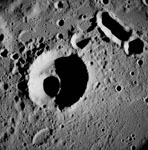
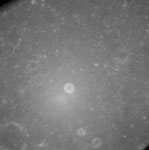
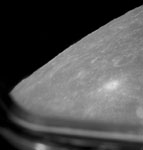
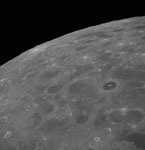
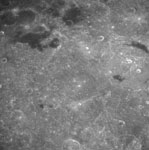
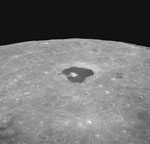
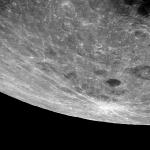
|
Frank
Borman, interviewed 4/13/99
Apollo
8 mission planning
It’s hard for us to fathom now. But the thing that’s
interesting about that mission was that, I don’t know,
maybe half a dozen of us sat in Chris Kraft’s office
one afternoon and we went over the flight plan, to try to
understand what would we do on the flight. And I’ve
always thought, again, it was an example of NASA’s leadership
with Kraft and their management style that we were able to
hammer out, in one afternoon, the basic tenets of the mission.
You know, the tracking people wanted us to stay up there a
month. I didn’t want to stay more than one—it
was a give-and-take, and Kraft called the shots. So we ended
up going around 10 times, and I never really thought about
going around behind [the Moon]. You’d lose radio contact;
but that’s about all.
Actually, the far side was lit, because the Sun was over there.
I remember that in order to go 10 revolutions around the Moon,
we had to launch at a certain time; but the recovery would
then be before sunrise. And the recovery people were concerned
about that. But all this was thoroughly discussed, and then
Kraft made the decision. It wasn’t a committee; it wasn’t
a—you know, it was one man who had the knowledge to
fly like that.
The
Christmas Eve message
Well, it’s another example of the wonderful country
we live in. Because Julian Sheer, who was the head of public
information for NASA in Washington, called me one day. He
said, “You’re going to have the largest audience
that’s ever listened to or seen a television picture
of a human on Christmas Eve and you’ve got 5 or 6 minutes.”
And I
said, “Well, that’s great, Julian. What are we
doing?”
He said,
“Do whatever’s appropriate.” That’s
the only instructions. But—and that’s the exact
word, “Do whatever’s appropriate.” Whatever
you feel is appropriate.
And to be honest with you, we were so involved in the mission,
I just kind of farmed that out to a friend of mine, Si [Simon]
Bourgin, and he consulted with some of his friends and came
back with the idea of reading from Genesis. And I discussed
it with Bill [Anders] and Jim [Lovell], and we had it typed
on the flight plan; and I didn’t give it anymore thought
than that.
Looking
back at Earth
Looking back at the Earth on Christmas Eve had a great effect,
I think, on all three of us. I can only speak for myself,
but it had for me. Because of the wonderment of it and the
fact that the Earth looked so lonely in the universe. It’s
the only thing with color. All of our emotions were focused
back there with our families as well. So that was the most
emotional part of the flight for me.
Read
Frank Borman's oral history transcript: http://www.jsc.nasa.gov/history/oral_histories/BormanF/bormanff.pdf
Christmas
Eve Message, December 24,1968
Apollo
8: Earth's Rise to a New Era
Return
to December: A Significant Month in Apollo

|
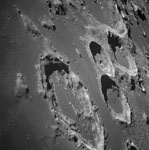
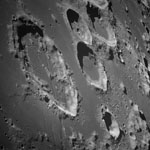
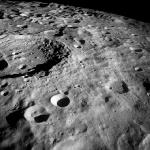
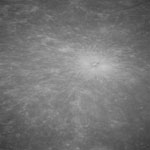
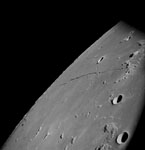
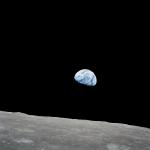
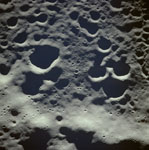
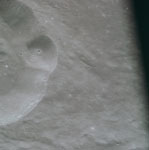
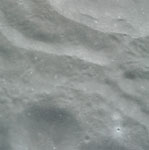
|
James
A. Lovell, Jr., interviewed 5/25/99
On
leaving Earth behind
My first sensation, of course, was “It’s not too
far from the Earth.” Because when we turned around,
we could actually see the Earth start to shrink. Now the highest
anybody had ever been up about 800 mi. or something like that
and back down again. And all of a sudden, you know, we’re
just going down. I reminds me of driving in a car looking
out the back window, going inside a tunnel, and seeing the
tunnel entrance shrink as you go farther into the tunnel.
And it was quite a sensation to think about. You had to pinch
yourself. “Hey, we’re really going to the Moon!”
I mean, “You know, this is it!” I was the navigator
and it turned out that the navigation equipment was perfect.
You couldn’t ask for a better piece of navigation equipment.
Earth
rise
And by the way, I’ll put everything to rest right now.
As I was coming around, when we saw the Earth coming up, who
took that famous Earth rise picture they made into a stamp
in 1969. Now you’ll likely get a different view from
[Framk] Borman or from [Bill] Anders. But I’ll have
to tell you right now. Now you think I’m going to say
that I took it? For 25 years I said that only to keep the
things going, to keep us young and happy. Keep a little controversy
in the game. Actually, I think Anders took the picture. But
you have to remember, I was the director. I told him where
to take it. I told him how to compose the picture. He just
happened to have a telephoto lens.
We were
so curious, so excited about being at the Moon that we were
like three schoolkids looking into a candy store window, watching
those ancient old craters go by—and we were only 60
miles above the surface. We didn’t have any kind of
feeling, at least myself, of fear or if, you know, are we
going to get back or not? It was just to be there was such
an exciting moment that we’d have done it all the time.
I felt very, very honored and lucky to be there.
The
effect of Apollo 8 on the world
At the
time, we didn’t know what the effect of the flight would
be. We didn’t know whether the flight was going to be
successful or not. But with riots and assassinations and the
war going on [that year], I was part of a thing that finally
gave an uplift to the American people about doing something
positive. That’s why I say Apollo 8 was really the high
point of my space career.
On Apollo
11, I was honored to be with [Charles A.] Lindbergh watching
the launch from the Cape, and I said to General Lindbergh,
“Isn’t this really apropos? I mean, this is the
most auspicious moment. These people are going to go up there
and they’re going to land on the Moon!” And Lindbergh
looked at me and said, “Well, yes, to a certain degree.”
He said, “But Apollo 8 was the real charger of this
whole program.”
The
Christmas Eve message
When we determined, first of all, that we would get and burn
into the lunar orbit on Christmas Eve we thought, “Boy,
something’s got to be appropriate to say. We ought to
say something. What can we say?” And we couldn’t
think of anything. Then there was a fellow that I think Borman
knew, his name was Si [Simon] Bourgin. Frank asked him, could
he come up with something appropriate? Well, he couldn’t.
But he knew another person, I think he was a newspaper man,
Joe Laitin, and he said, “Okay, I’ll think it
over. I’ll try to see what I can do.”
He was
working almost all night trying to think of appropriate words
and his wife came down and said, “Why don’t you
have them read something from the Bible?”
And he
said, “Well, that’s the New Testament.”
“No,”
she said, “the Old Testament. Read it from the Old Testament
because this would be very appropriate. And most of the people
in the world will be listening in. And most of the people
in the world are not Christian.”
So, that’s
how it came to pass that he said the first 10 verses of Genesis,
which is really the foundation of many of the world’s
religions. So, that’s how it got started.
And [as
we read it] at the same time we had this sort of now rudimentary
TV camera, black-and white camera, that was pointing out the
window watching the craters go by and slowly slipping into
daylight.
Read
Jim Lovell's oral history transcript:
http://www.jsc.nasa.gov/history/oral_histories/LovellJA/lovellja.pdf
Christmas
Eve Message, December 24,1968
Apollo
8: Earth's Rise to a New Era
Return
to December: A Significant Month in Apollo

|
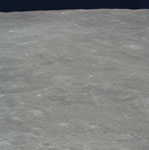
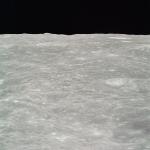
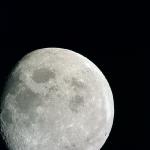
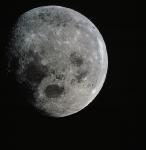
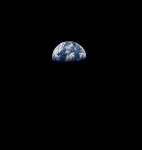

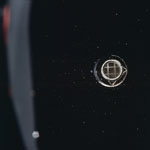
|
William
A. Anders, interviewed 10/8/97
Saturn
V launch
We had simulated essentially everything we could think of,
or anything anybody could think of on that flight, all previous
flights, and in centrifuges, in zero G airplanes, and procedure
trainers. And yet the very first seconds of the flight were
a total surprise to everybody because the Saturn V, which
is a big tall rocket, kind of skinny, more like a whip antenna
on your automobile, and we were like a bug on the end of a
whip. It actually gets very massive near the bottom, with
the center of gravity near the bottom, so if you rotate it,
what little bit of wiggle on the bottom translates to a big
wiggle up at the top.
These giant F-1 engines, each producing a million and a half
pounds of thrust, were trying to keep the rocket going straight.
So, it was being thrashed at the bottom and we were getting
really thrashed at the top. I mean, violent sideways movement
and massive noise that nowhere near had been simulated properly
in our simulations. For about the first ten, seemed like forty,
but probably the first ten seconds we could not communicate
with each other. Had there been a need to abort detected on
my instruments I could not have relayed that to [Frank] Borman.
So we were all out of it, on our effectively unmanned vehicle
for the first ten or twenty seconds.
The next most impressive thing was that as we burned out on
the first stage. We were hitting about six or eight G’s
and we were back in our seats. You could hardly lift your
arms, you have trouble breathing, but you’re not blacked
out because of the way your blood was flowing from your legs
down into your torso. But, try to reach up, it’s like
you had a twenty pound weight in your hand. All the fluid
in your ears is being pushed back into the seat along with
your body.
Then the engines cut off, and just as they cut off some retro
rockets fire to try to move that big first stage away from
the second and third stage but slightly before it separates.
So, you go from a plus six G to a minus one-tenth, and the
fluid in your ears just goes wild.
I felt like I was being catapulted right through that instrument
panel. Instinctively, I put my hand up in front of my face,
and just about the time I got my hand up, the second stage
cut in. Whack-o, right onto the face plate with the wrist
ring, which left a gash. I thought, “Oh, damn, here
I am, the rookie of the flight, and sure enough here’s
this big rookie mark.” When we got into orbit and I
got out of my seat and we took off our suits and each guy
handed me their helmet to stow, sure enough, each one of them
had a gash in it from the same thing.
This very delicate, colorful
orb
But, the most impressive aspect of the flight was when we
were in lunar orbit. We’d been going backwards and upside
down, didn’t really see the Earth or the Sun, and we
rolled around and came around and saw the first Earth rise.
That certainly was, by far, the most impressive thing. To
see this very delicate, colorful orb which to me looked like
a Christmas tree ornament coming up over this very stark,
ugly lunar landscape really contrasted…. So here was
this orb looking like a Christmas tree ornament, very fragile,
not an infinite expanse of granite and seemingly of a physical
insignificance, and yet it was our home.
Read
Bill Anders' oral history transcript: http://www.jsc.nasa.gov/history/oral_histories/AndersWA/anderswa.pdf
Christmas
Eve Message, December 24,1968
Apollo
8: Earth's Rise to a New Era
Return
to December: A Significant Month in Apollo

|
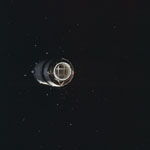
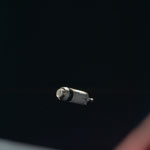


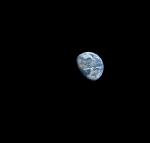
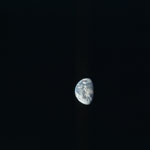
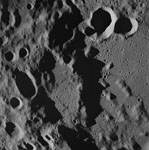
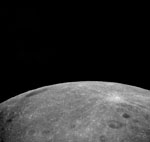

|
Christopher
C. Kraft, Jr., interviewed 5/23/08
Operational
capabilities
The Marshall Spaceflight Center under Wernher von Braun was
building the Saturn V. They're rocket people. They know the
rocket business. When we flew the first Saturn V, it looked
like it was a great flight, but it wasn't. We had problems
on all three stages, problems on the first stage, second,
and third stage. They were not serious problems on that flight
because it made it. It did its job.
Well, the second flight was a disaster. I want to emphasize
that. It was a disaster. The first stage had pogo (bounce).
The second stage had pogo so badly that it shook a 12-inch
I-beam; it deflected a foot as it was flying in the second
stage. The third stage ignited and then shut down, and it
would not restart, which was a requirement to go to the Moon.
It also had some vibratory problems. Here's the Saturn rocket
that everybody thinks is a wonderful piece of hardware but
it almost busted itself into pieces in all three stages.
In July of 1968, the Command/Service Module had become a good-looking
piece of hardware. That part of the program was really progressing
well, and we all had a great deal of confidence that it would
fly and fly well. But the Lunar Module was a mess. It was
a mess because it had to be light and we were using these
very delicate pieces of structure. Just everything was going
wrong with it and it wasn’t going to be ready for a
while.
During those early Apollo planning meetings, we had set out
various categories with objectives that we wanted to accomplish.
We wanted to prove to ourselves that the hardware was satisfactory
and would accomplish the operational capabilities that we
had set out in terms of rendezvous, docking, heat reentry
capabilities, control, navigation and guidance, et cetera,
et cetera—all needed capabilities to reach the Moon.
We believed it probably would take more than one flight to
accomplish the tasks we required; we thought to prove this,
it'd take us two or three flights.
Turned out it took us one flight to do them all. That was
a surprise to all of us....
Most significant mission ever
Although a lot has been accomplished, Apollo 8 probably remains
as the most significant mission ever flown. The first flight
of the Shuttle from a technical point of view was equivalent.
But not from the total aspect, not from an emotional or the
significant effect on the country and on the world that Apollo
8 had.
Man had been looking at the Moon ever since they could see
and wondering about it, thinking about it, looking at it from
a religious point of view, from an astrological point of view,
from a farmer's point of view, then later from a scientific
point of view. Putting ourselves in the position of having
a man leave the Earth for the first time, being able to look
back at the Earth for the first time, realizing the environmental
aspects of that, —you can just go on and on.
The firsts involved in Apollo 8 almost were unlimited, if
you stop to think about it, from an educational point of view,
a theological point of view, an esthetic point of view, an
art point of view, from culture, scientifically, philosophically,
engineering wise, management wise, scope of capability wise.
Outside of a war, we have never done anything like that in
this country.
That event was a milestone in history, which in my mind unless
we land someplace else where there are human beings, I don't
think you can match it.
It was an opportunity for those of us that were allowed to
do it that doesn't present itself very often in any human
being's life. We were extremely fortunate that all the conjunction
of the stars and the politics and the money and the technology
all came together in the 60s, in '68. That was a very extremely
unique period in man's history from all those points of view.
In the 60s, even though people might not like you, even though
they seemed to be hard to get along with, even though you
thought they were going off in the wrong direction, you knew
you all had the same thought in mind, you knew everybody was
trying to get to land men on the Moon. We were given an opportunity
to do it, and we did it. But that's a characteristic of the
American human being. That's what makes us great.
Read
Chris Kraft's oral history transcripts: http://www.jsc.nasa.gov/history/oral_histories/KraftCC/kraftcc.pdf
Christmas
Eve Message, December 24,1968
Apollo
8: Earth's Rise to a New Era
Return
to December: A Significant Month in Apollo

|






|
Glynn
S. Lunney, 1/28/99
A
very courageous and bold decision
We went to the Moon on the second Apollo manned
flight, Apollo 8. We'd never have had the courage to do that
if we didn't have the experience that we had in the Gemini
Program, both the flight crews, the ground crews, planning
teams, the engineering teams.
We were ready, and as soon as we got the launch vehicle and
the spacecraft that could go there, it was a very courageous
and bold decision that became Apollo 8, but the teams of people
were ready for it. They were ready for it, and it was a result
of what we learned and what we matured through the Gemini
experience. I mean, it was a real training ground for us….
Let's
go for the mission that it was designed for
The [Saturn V] engine testing had gone well,
[and] once we were getting to the point of saying we were
going to put people on board, you know, you're going to light
this thing and fire it, so we got to the point of saying,
well, as long as we're going to do that, we're taking all
of the risks, we might as well try to get the best gain that
we possibly can out of it. You could have used the Saturn
V to do an Earth orbital flight, but it was oversized for
that, and you wouldn't have gotten a full, complete test of
it, or people might have fired the engine in such a way in
lower Earth orbit to keep it in lower Earth orbit but still
fire the engine the whole duration. And we began to adopt
the attitude, well, as long as we're going to fire this thing
the whole way, then let's go for the mission that it was designed
for and take it out to the Moon, which was done on Apollo
8.
So once we got over the initial problems that we had on 502
[Apollo 6], the unmanned flight, and saw that those things
were fixed, then it became a matter of getting used to the
idea that, well, we're going to light this thing, it's going
to burn full duration somehow or another, in some direction
or another, so instead of going sideways, why don't we go
to where we want to go; go to the Moon.
Once you decided to take the risk of putting people on it
and firing it for full duration, you might as well fire it
at the mission that it was designed for, rather than some
strange thing that would have been less than a lunar mission
but still would have entailed all the risk of firing the engine
and running it full duration, firing the stages and firing
them for the full duration that they were planned for. So
once we got used to that idea, we said, yes, let's get on
with it….
Apollo 8 was great. Apollo 8 was kind of like the door opener
for the lunar landing mission. I think all the people, certainly
in the operations team—the flight crews, I think, didn't
feel quite the same way—but for us, all that had to
be done to plan and execute the Apollo 8 mission says that
we really knew how to do that. We opened the door so that
the next couple of flights were test flights. Getting to the
lunar landing mission was shorter than it otherwise would
have been, but we got there with confidence as a result of
Apollo 8.
Read
Glynn Lunney's oral history transcripts: http://www.jsc.nasa.gov/history/oral_histories/LunneyGS/lunneygs.htm
Christmas
Eve Message, December 24,1968
Apollo
8: Earth's Rise to a New Era
Return
to December: A Significant Month in Apollo

|
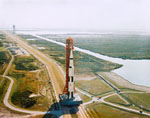
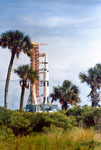
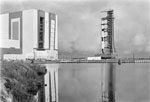
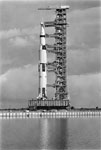
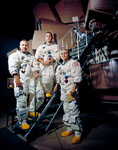
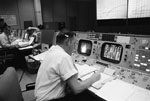
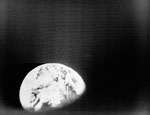
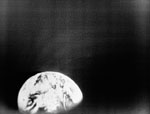
|
John
W. Aaron, interviewed 1/18/00
The
importance of Apollo 8
We had no idea when we were flying Apollo 7—at least
I didn't and most of the team here—that there was also
a plan to take Apollo 8 to the Moon if we were successful.
We were totally in the dark about that, because there was
a small group off planning that. When they announced Apollo
8, I just couldn't believe it, but we were all over George
[M. Low] to go try it, because we were young enough to try
anything.
To me, Apollo 8, if you just had to plot a graph of the pinnacle
of the exciting part of my career, that was probably the peak,
more so than the landing on Apollo 11. Now, that probably
sounds funny to say that. Well, two reasons, I think. One,
just the boldness of it, that it was announced over such a
short interval. In my case, being a command and service module
systems person, systems flight controller, it was the vehicle
that I watched when I had the prime stage, and the fact that
it was first and it was going to be done over Christmas, I
mean, looking back on it, that was the pinnacle.
The lunar landing, the actual landing on Apollo 11 ranks right
up there, and I don't think I'm unique there. You ask people
like me. I think they'd probably say Apollo 8 was [the pinnacle].
I was very surprised on Apollo 8, because I had helped make
some calls to correct a couple of anomalies with both the
command module on the way out to the Moon, and so I was very
surprised when they came around the Moon and started naming
off craters and they named one after me. It bowled me over.
I would have never had thought they were going to do that.
So that was a big surprise.
The Christmas Eve message
And then the other big surprise, of course, because we were
all sitting there with our fingers crossed, because we were
in lunar orbit and we couldn't wait to get out of lunar orbit,
I remember that, but when the crew came around the horn from
the far side of the Moon and started reading from Genesis.
To watch the reaction in the Mission Control Center, because
here we are, totally concentrating on our technical job, and
for that to happen, it just didn't occur to us, because none
of us had any clue that was going to happen. And it took us
a while to realize what was happening, the significance of
that, and—wham!—it hit us. I mean, looking back
on it, nothing could have been more perfect of a thing to
have been said.
I think it not only impacted everyone in Washington, but it
particularly impacted the mission controllers, because they
were sitting there doing this highly technical jargon-oriented
job, and then just the transition from that to a reading from
Genesis, that was the big surprise.
A bold move
Apollo 8, of course, culminated a lot of things, because we
had spent so much time redesigning the spacecraft, it seemed
like a lot of time then. In today's world it doesn't seem
much time at all, because what we do now in years we judged
then in months. We just completely redesigned the vehicle,
had one test flight on Apollo 7, and then made the decision
to go to the Moon, and it was highly successful, not only
the spacecraft, but the Saturn V. We forget sometimes the
shaky start the Saturn V had. We had 501 and 502, and those
were not anomaly-free missions. Had major anomalies with the
boosters on those two unmanned flights. So it was a bold move.
Read
John Aaron's oral history transcripts:
http://www.jsc.nasa.gov/history/oral_histories/AaronJW/aaronjw.pdf
Christmas
Eve Message, December 24,1968
Apollo
8: Earth's Rise to a New Era
Return
to December: A Significant Month in Apollo

|
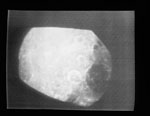
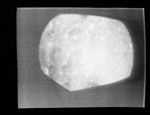

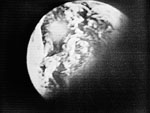
|
Richard
H. Battin, interviewed 4/18/00
There
was another exciting thing on Apollo 8. When they disappeared
behind the Moon, they were going to have to make a major velocity
change to get into lunar orbit, and that took place when nobody
could see them.
A lot of nervousness there. Our system had to work. If it
didn't, we might never see the astronauts again. It could
be that they would make a correction which would send them
crashing into the Moon, or the whole thing might blow up when
they turn the engine on, and you'd never know it. So there
was a lot of anxious moments there till they appeared coming
out from the other side.
When they came out, they announced their position and velocity,
and the ground people said, "What are they talking about?
We haven't even had a chance to track them yet. How do they
know what their speed is and where they are?"
They forgot they had an onboard system that was telling them
all that stuff. So it took a while for the ground folks to
realize that there was all this capability they had on board
and it really worked.
Read
Richard Battin's oral history transcript: http://www.jsc.nasa.gov/history/oral_histories/BattinRH/battinrh.pdf
Christmas
Eve Message, December 24,1968
Apollo
8: Earth's Rise to a New Era
Return
to December: A Significant Month in Apollo

|
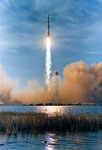
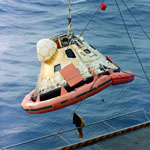
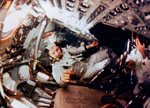
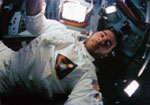
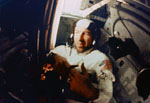
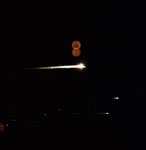

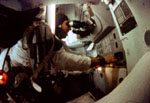





|
Jerry
C. Bostick, interviewed 2/23/00
Planning
the Apollo 8 mission
Several months before we flew Apollo 7, which was the first
manned mission that actually made it into orbit after the
horrible catastrophe that we had with the [Apollo 1] fire,
a few people had been challenged by Chris Kraft to go figure
out why on the next flight, which turned out to be Apollo
8, that we couldn't go all the way to the Moon, which was,
in retrospect, a very aggressive move. Here we were, we'd
had the disaster, the Apollo 1 fire, and totally redesigned
the command module, and we hadn't even flown it yet to prove
that it would work, and here we were working on going to the
Moon, which at first was a big shock.
In fact, the first meeting when I was called to Kraft's office,
I think it was just me and Gene Kranz and Arnie Aldrich, as
I recall, and he asked us to look into the possibility of
going to the Moon with the second flight. And I thought, "This
man is crazy. What are we talking about?" But by the
time we left the meeting, you know, I was already thinking,
well, okay, why can't we, and what do we have to do, and what
we have to accelerate. Within a couple of days, we figured
out there's really no reason why we can't do this, which I
think is the boldest, most aggressive thing that ever happened
in the manned space program….
We had just totally redesigned the Apollo spacecraft, had
never flown it to see if it was going to work or not. We had
a very logical path laid out to get to the lunar landing,
and it involved at least two more flights in Earth orbit.
So at that point we were a long way from thinking about flying
it to the Moon. The capability that we had in the Control
Center was not ready for that.
My initial reaction is, "Hey, we aren't ready for this.
What are you talking about? We've got a plan here. We've got
to go through 7, 8, 9, 10, and then maybe 10, we go to the
Moon. But not on 8, not the second flight around." But
after a small group of people looked at it for a few days,
we couldn't come up with any reason why we couldn't do it,
and started a lot of detailed planning.
Our bosses didn't even know it. I couldn't tell [Glynn] Lunney,
for example. John Hodge was my division chief at the time.
I couldn't tell him that we were working on this. We were
having to steal computer time over the weekend. We'd go back
to Chris and say, "Well, I need these two other guys
to be involved," and usually he would say yes. Sometimes
he would say, "Okay, well, you can get one of them, but
not the other." They just didn't want the cat out of
the bag until a real thought-out decision had been made.
Translunar injection
I remember probably as much or more about Apollo 8 as any
other mission, just because it left such a lasting impression
on me. We had so many firsts, starting with translunar injection,
and it hits you, “My God, we're leaving Earth.”
I mean, translunar means you're going to the Moon, and oh,
by the way, you're leaving Earth and somewhere up there you're
going to hit a point where you're going to leave the gravitational
influence of the Earth and be under control of the gravitational
influence of the Moon.
We're shooting for a target that's not there yet. Translunar
injection is kind of like duck hunting. You don't shoot at
the duck; you shoot way out in front and let the duck fly
into it. So we're aiming at this point up in the sky, and
we're depending on things we've never done before, tracking
data, computing maneuvers, relaying the information to the
crew, loading it in their computers, and doing all this. A
lot of miracles and magical things, almost, have to fall into
place to make it all successful.
When you consider the margin of error and how, as viewed from
the Earth, that the altitude that we were shooting for above
the Moon wasn't even as thick as a sheet of paper. So there
were a lot of firsts involved, a lot of memorable events.
The fact of when it occurred, over Christmas, also was extremely
special after translunar injection. And we're all fairly intelligent
people, we knew what we were doing, but I tell you, for at
least a half an hour there were a lot of us standing around
looking at each other saying, "We're really going to
the Moon. We've got these guys headed out of Earth orbit.
They're leaving us." ...
We did very detailed minute-by-minute return to Earth planning.
Okay, if this happens now, then we'll have thirty minutes
to figure it out. Okay, so here's a time we can fire up the
engine and then come back to Earth and where we'll land. I
mean, we probably way overdid that, but in a situation like
that, there's no way to overdo it, because you can't be cut
short....
The dark side of the Moon
Then the next big thing was when they go around behind the
Moon and we lose contact. All the flight controllers kind
of sit there and after a while they realize we have no data,
we can't talk to them, this would probably be a good time
to take a break, but we don't take breaks. [Laughter] It was
kind of awkward, it really was. We can't desert them, all
get up and leave the Control Center, but for the next twenty-five,
thirty minutes, however long it was, there's no way we can
talk to them, we have no data, so why not? So there was a
big rush on the restrooms then all of a sudden.
And
tremendous satisfaction, by the way, on the part of the people
in the trench especially. When we did lose them, lost the
signal as they went behind the Moon, it was [snaps fingers]
exactly when we had predicted it. So, yes, orbital mechanics
works. God works. He brought the Moon in exactly the right
spot at the right time.
Then a very similar thing when we had acquisition of signal
on the way back, as they came around from the back side of
the Moon, it had to be one of the happiest moments of my life
and for most of the people, I think, in the Control Center.
Again, it was, hey, orbital mechanics works, and there has
to be a God, because he's doing his part.
Then when the crew started reading from the Bible, I think
it was the first time that a lot of us could relax enough
to say, "Hey, we just sent people around the Moon and
it's Christmas. And they're reading from the Bible and relating
this, 'God created the heavens and the Earth.' This is unbelievable."
Read
Jerry Bostick's oral history transcripts: http://www.jsc.nasa.gov/history/oral_histories/BostickJC/bostickjc.pdf
Christmas
Eve Message, December 24,1968
Apollo
8: Earth's Rise to a New Era
Return
to December: A Significant Month in Apollo

|






|
Eugene
F. Kranz, interviewed 1/8/99
Mission
Control during Apollo 8
We then went into Apollo 8, the first mission to the Moon.
This is one where I was almost glad I was sitting on the sidelines.
Mission Control and the flight directing business is really
amazing. It always seems that the people who are watching
the mission get more emotionally involved in the mission than
the people who are doing it, because the people who are doing
it have got to be steely-eyed missile men, literally. I don't
care whether they're 26 years old or 35. The fact is that
you've got to stay intensely focused on the job. It is the
people who are sitting in the viewing room, I think, who have
it the toughest, flight directors who are trying to find a
way to plug into somebody's console so they can listen in
to what's going on.
I think that was probably the most magical Christmas Eve I've
ever experienced in my life, to actually have participated
in a mission, provided the controllers, worked in the initial
design and the concept of this really gutsy move, and now
to really see that we were the first to the Moon with men.
We were at the point where we were setting records, literally,
in every mission that we flew in those days, because the Russians
had long since ceased to compete; it was obvious that we had
the best opportunity for the lunar goal. And this was just
a magical Christmas. I mean, you can listen to [Frank] Borman,
[James A.] Lovell, [Jr.] and [William A.] Anders reading from
the Book of Genesis today, but it's nothing like it was that
Christmas. It was literally magic. It made you prickly. You
could feel the hairs on your arms rising, and the emotion
was just unbelievable….
Certain of the crews at certain times just seemed to have
a magic ability to select the right thing and do the right
thing at the right time, and Apollo 8 was one of those days.
I was just happy as all get-out that I was one of the few.
Glynn Lunney used a term, that as flight controllers working
in Mission Control, to be flight directors or as a member
of the team we were always drinking wine before its time,
because we were doing things for the first time. We were working
missions that people a century from now are going to read
about, but we never had time to really savor it, because as
soon as we finished one, we'd be on to the next.
As a flight director sitting off-line, not working the mission
this time, I did have an opportunity to really savor, to really
get emotionally involved with what was going on, where the
people working the console never had that chance. I mean,
they've got to stay focused, and if they get out of line for
even a second, that flight director's going to come down and
say, "Okay, everybody get your eye. Get squared away.
Get back to business. Let's cut all this crap out." It's
interesting to live in that environment.
Read
Gene Kranz's oral history transcripts:
http://www.jsc.nasa.gov/history/oral_histories/KranzEF/kranzef.pdf
Christmas
Eve Message, December 24,1968
Apollo
8: Earth's Rise to a New Era
Return
to December: A Significant Month in Apollo

|



|
Joseph
P. Loftus, Jr., interviewed 10/27/00
You
can't flinch
But I think, in a sense, Apollo 8 was a more daring event
for me. That was one of those decisions that you could never
get a committee to make. George Low, in effect, said, "Why
don't we do that," and he was saying it in such a way
that said, "We're going to do that unless you can prove
to me there's some reason we shouldn't." And he talked
with a number of people, and I was in some of those conversations,
and we made the decision to go do it.
It was a real event to go into orbit around the Moon the first
time. To give you some sense of it, imagine you're going down
the highway at 80 miles an hour and you can see a train begin
to cross the highway, and you keep going 80 miles an hour
and the train keeps crossing the highway.
You wonder, is the train going to be gone when I get there,
or am I going to hit it? Well, going into orbit around the
Moon means that you're going to pass just five feet behind
the train. So you can't flinch.
That was a fairly profound one.
Read
Joe Loftus' oral history transcripts: http://www.jsc.nasa.gov/history/oral_histories/LoftusJP/loftusjp.pdf
Christmas
Eve Message, December 24,1968
Apollo
8: Earth's Rise to a New Era
Return
to December: A Significant Month in Apollo

|







|
Thomas
K. Mattingly II, interviewed 11/6/01
Does
anyone know where the Moon is?
It was the middle of the week sometime, because they called
us all together and said we’re going to have a briefing.
I believe it was Saturday morning. We walked in, and that’s
when they revealed to us that they were going to do the Apollo
8 circumlunar mission.
I remember
from that Saturday morning, it was 24/7 until they got down.
Of all of the events to participate in, you know, I was lucky
because I could do Apollo 11 as well as 8 and then 13.
But being
part of Apollo 8, it made everything else anticlimactic. Our
purpose was to go land on the Moon, but somehow participation,
the angst that went with that Apollo 8 mission was far more
electrifying. I remember after the first set of briefings,
and listening to these meetings, it’s like no one had
ever thought about going to the Moon. We’ve been in
this program for how many years, and yet people are asking
questions that are almost like, “Does anyone know where
the Moon is and how to find it?” And here we’re
supposed to be going.
Tindallgrams
It was built into those beginnings of what they started calling
data priority. There were so many questions, and every one
of them needed an answer. But the difference between designing
hardware and getting ready to fly a mission, this was my first
exposure to how dramatically different that was.
Bill
[Howard W. Tindall, Jr.] came out and started having these
meetings. His initial charter, as I understand it, was just
see if you can figure out an order that we can answer these
questions in, because we can’t do it all at once. Let’s
do the most important ones first. So we started having these
meetings.
That kind of put some sanity and sense to it. It created this
thing we called Tindallgrams. Because Bill Tindall
would listen. These meetings would go on sometimes two days,
and they would be eight in the morning until eight in the
evening, whatever it took. Room filled with people. Not always
a lot of decorum. Bill was after answers. It was nowhere near
as collegial an environment as you see in some organizations
today.
But they were after what was right, and everybody was passionate
about. Everybody was young so they were kind of brash and
there wasn’t a lot of patience anywhere. So some of
those meetings were very, very colorful. Some of the characters
were colorful. At the end of this, you were just inundated
with all of this stuff you’ve heard. And now what?
And the next day you would get this two-, maybe three-page
memorandum from Bill Tindall written in a folksy style, saying,
“You know, we had this meeting yesterday. We were trying
to ask this. If I heard you right, here’s what I think
you said and here’s what I think we should do.”
And he could summarize these complex technical and human issues
and put it down in a readable style that—I mean, people
waited for the next Tindallgram. That was like waiting for
the newspaper in the morning. They looked forward to it.
Read
T. K. Mattingly's oral history transcripts: http://www.jsc.nasa.gov/history/oral_histories/MattinglyTK/mattinglytk.pdf
Christmas
Eve Message, December 24,1968
Apollo
8: Earth's Rise to a New Era
Return
to December: A Significant Month in Apollo

|





|
Dale
D. Myers, interviewed 3/5/99
Our
first critical issue
We had just finished a really terrific flight on Apollo 7.
I think it was George Low who came up the idea of doing Apollo
8, which was to go around the Moon solo with the command and
service module. The problem was, the lunar module was behind
schedule, and if we waited for the lunar module to be ready
to go for the next flight, it looked like there was a good
chance we would miss making it in this decade.
So the idea of coming to the figure-eight around the Moon
came up, and George Mueller sent all of the program managers
in the industry a letter asking them if they were confident
that we could make that flight. Our first critical issue,
the key issue, was that without the lunar module, we were
in a position that if the service module engine failed, the
guys would sail on out into space. So it was pretty important
that we make that thing work.
It had worked fine on the previous flight and we went through
a whole series of detailed reviews on all the elements of
the command module and service module to make sure that everything
was good and everything looked like it was ready to go, all
the equipment had been properly certified and had no anomalies
that looked like it might give us a problem. After a review
with the Aerojet guys and with our people, just totally soul-searching
that thing, I signed off, saying, "I'm confident you
can make that flight." ...
The unk-unks
Now, in retrospect, you look back, we had looked through all
the systems, and we had looked through all the systems of
the service module, which included the oxygen tanks that blew
up on Apollo 13. If that had happened on Apollo 8, we would
have lost those guys, because we had no lunar module to bring
them home.
So even though you have been through all the elements and
you can't find anything that would give you a problem, there
are always what we used to call the unknown unknowns—the
unk-unks. Those are things that are just complete surprises,
and that's what happened Apollo 13, and it could have happened,
something of that nature could have happened on Apollo 8.
Of course, it didn't.
Read
Dale Myers' oral history transcripts: http://www.jsc.nasa.gov/history/oral_histories/MyersDD/meyersdd.pdf
Christmas
Eve Message, December 24,1968
Apollo
8: Earth's Rise to a New Era
Return
to December: A Significant Month in Apollo

|




|
Granville
E. Paules, interviewed 11/7/06
That
eerie feeling
I was the guy on the mission when they went behind the Moon,
so there was a little fine-tuning maneuver we did. The understanding
of the gravity effects of the Moon, we’re still learning
about those, and so you weren’t absolutely, perfectly
clear about how, when you go looping around the Moon, exactly
what the effect on the vector, the spacecraft vector, would
be.
We had done enough simulations. You had enough math models.
They’d had the unmanned spacecraft try to land on the
Moon. So we were pretty clear, but the main thing is doing
it the first time, and these guys on that Christmas Eve go
zipping out there. Everything is perfect. We had no problems
at all with Apollo 8 all the way out. It’s just that
eerie feeling when the guy goes behind the Moon that first
time. That’s the first time that humans had ever been
out of sight of Earth.
There was this quiet period while they’re behind the
Moon the 20-some minutes or so that you don’t talk to
them. The procedure is as soon as they’re supposed to
be in radio contact, the CapCom starts calling them. Well,
they call and call, and it seemed like at least a minute after
they should have been in view before we ever heard from them.
So, the place gets quieter and quieter while you’re
waiting for that first voice contact back from those guys.
Then they went through all the little comments that made all
the history. It was a very exciting time for all of us. That
was pretty unique for a few of us.
Read
Gran Paules' oral history transcripts: http://www.jsc.nasa.gov/history/oral_histories/PaulesGE/paulesge.pdf
Christmas
Eve Message, December 24,1968
Apollo
8: Earth's Rise to a New Era
Return
to December: A Significant Month in Apollo

|



|
G.
Merritt Preston, interviewed 2/1/00
A
tremendous success
Even Apollo 8, though, you just couldn't believe that they
were going to do that. I didn't have any input into doing
it or not doing it, except wanting to get on with it, but,
boy, I'm telling you that was a huge step. I wonder how the
three astronauts really—they must have gone into that
with a certain amount of destiny in their thinking, because
the odds were greatly unfavorable. I mean, hell, how in the
world could we expect to do that? But we did.
That
was a tremendous success. You know it changed the whole environmental
attitude of the world when they saw that picture of the Earth.
I mean, it did more than to advance the environmentalism than
anything that ever happened.
Read
Merritt Preston's oral history transcript: http://www.jsc.nasa.gov/history/oral_histories/PrestonGM/prestongm.pdf
Christmas
Eve Message, December 24,1968
Apollo
8: Earth's Rise to a New Era
Return
to December: A Significant Month in Apollo

|








|
Rodney
G. Rose, interviewed 11/8/99
It
was a gutsy thing
A lot of people have asked me which was the high point in
the Apollo Program, thinking that it’s Apollo 11. Well,
11 was really something, but I think as the high point, Apollo
8 had to take the vote, because as an engineer, it was the
first time we’d been out there, and we only had the
one engine to come back with.
Now, Rocketdyne and North American and Rockwell would say,
“Well, there was redundancy to the gazoos on that engine.”
I’d say, “Yes, but you only had one nozzle,”
and if anything went wrong with the nozzle, as we found out
on Shuttle not too long ago, a nozzle problem can cause some
gas pain, to put it mildly. So it was a gutsy thing.
Of course, Chris Kraft and George Low and all those people
set the thing up in the late summer, and I got the job of
putting the profile together.
Among other things, at that time, I was on the vestry of St.
Christopher Church in League City, and Frank Borman was a
lay reader there, and so the beginning of October we had the
vestry meeting, and Frank says to the minister—he was
scheduled to be lay reader at Christmas Eve service, you see,
and he said, “I’m going to be on travel,”
because he wasn’t allowed to say where he was going.
Now, I knew where he was going, so I took Frank outside, and
I said, “Frank, I think we can work this. If you read
the prayer and stuff from the Moon, I’ll get it taped
in the MCC and whip the tape over to the church and we can
play it in the service.”
So we went back in and told the minister, “Frank can
do that. He’s decided he can do it.” Of course,
by the time Christmas got near, everybody knew that he and
Jim Lovell and Bill Anders were the crew going, and that’s
when we let the minister in on the secret….
The timing was exquisite
In one of the early—I forget, I think it was about the
fourth or fifth rev around the Moon, Frank comes on and says,
“Is Rod Rose there? I’ve got a message for him
and for the people of St. Christopher. In fact, it’s
for people everywhere.” I’d called the thing “Experiment
P-1,” for first prayer from space. So Frank read that
and we recorded it, and then, of course, they came out with
the reading of the first ten verses of Genesis, which was
super. I had nothing to do with that, other than record it.
So that worked in great, because I got off duty and took [the
recordings] over to the church, and I’d set up with
the guys on duty in the MCC to give me a call as soon as the
vehicle had come around from behind the Moon, because all
our trans-Earth burns from the Moon were made behind the Moon,
so you didn’t know whether it was a good burn or not
until they came back. They’d finished the burn, came
around from behind the Moon, and then that was the big “uncross
your fingers.”
The timing was exquisite, because that happened just before
midnight local time in Texas, and they phoned me at the church
and I was able to give a little message, a piece of paper
to the minister. At that time, we’d had the midnight
communion and he was about to dismiss the congregation with
a blessing, and he was able to tell him that they were on
the way home.
Read
Rod Rose's oral history transcript: http://www.jsc.nasa.gov/history/oral_histories/RoseRG/roserg.pdf
Christmas
Eve Message, December 24,1968
Apollo
8: Earth's Rise to a New Era
Return
to December: A Significant Month in Apollo

|






|
Christmas
Eve Message, December 24,1968
(Audio/video broadcast)
Apollo
8, the first manned mission to the Moon, entered lunar orbit
on Christmas Eve, December 24, 1968. That evening, the astronauts;
Commander Frank Borman, Command Module Pilot Jim Lovell, and
Lunar Module Pilot William Anders did a live television broadcast
from lunar orbit, in which they showed pictures of the Earth
and Moon seen from Apollo 8. Lovell said, "The vast loneliness
is awe-inspiring and it makes you realize just what you have
back there on Earth." They ended the broadcast with the
crew taking turns reading from the book of Genesis.
William
Anders:
"For
all the people on Earth the crew of Apollo 8 has a message
we would like to send you".
"In
the beginning God created the heaven and the earth.
And the earth was without form, and void; and darkness was
upon the face of the deep.
And the Spirit of God moved upon the face of the waters. And
God said, Let there be light: and there was light.
And God saw the light, that it was good: and God divided the
light from the darkness."
Jim
Lovell:
"And
God called the light Day, and the darkness he called Night.
And the evening and the morning were the first day.
And God said, Let there be a firmament in the midst of the
waters, and let it divide the waters from the waters.
And God made the firmament, and divided the waters which were
under the firmament from the waters which were above the firmament:
and it was so.
And God called the firmament Heaven. And the evening and the
morning were the second day."
Frank
Borman:
"And
God said, Let the waters under the heavens be gathered together
unto one place, and let the dry land appear: and it was so.
And God called the dry land Earth; and the gathering together
of the waters called he Seas: and God saw that it was good.
And
from the crew of Apollo 8, we close with good night, good
luck, a Merry Christmas, and God bless all of you - all of
you on the good Earth."
Apollo
8 Christmas Eve Message (40MB, MOV)
Return
to December: A Significant Month in Apollo

|


|
Apollo
8: Earth's Rise to a New Era
The audio
documentary, Apollo 8: Earth's Rise to a New Era,
features excerpts of oral histories combined with a narration
to present a unique perspective on a venture that resulted
in humankind's first voyage to another celestial body.
The voices
from these managers, engineers, and astronauts convey the
significance of a mission necessary for the success of the
manned lunar landings that followed. Hearing their emotions
as they speak, soundly reinforces the immediate impact this
mission had on NASA, as well as its effect on a nation's goals.
Narrated
by Clay Morgan, Apollo 8: Earth's Rise to a New Era
was recorded in December 1998 in celebration of the 30th anniversary
of Apollo 8.
Apollo 8: Earth's
Rise to a New Era (5MB, MP3)
http://www.jsc.nasa.gov/history/apollo8_mp3/Track
01.mp3
|
| |

Return
to December: A Significant Month in Apollo
Return
to JSC History Portal |

|





